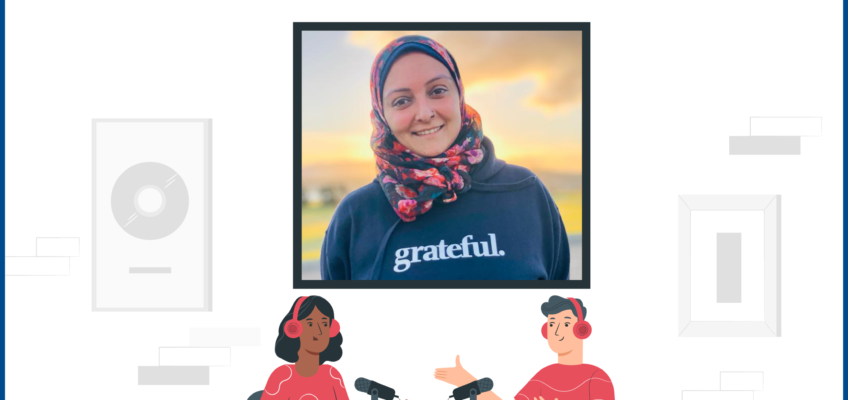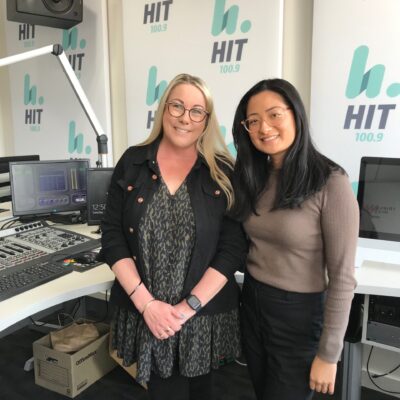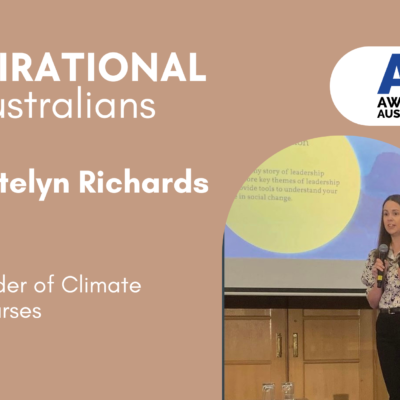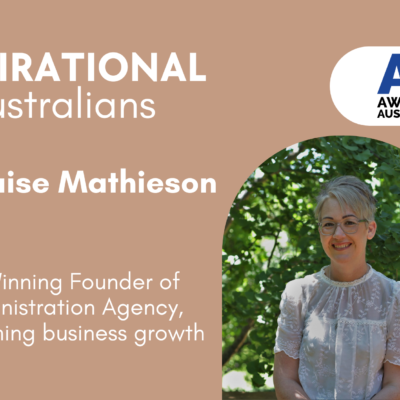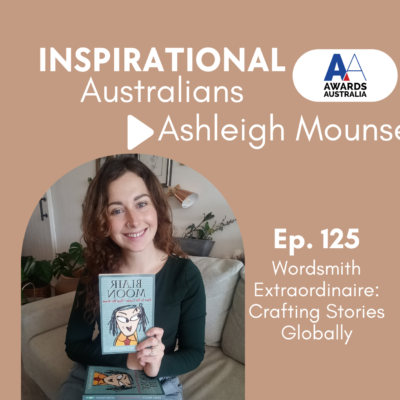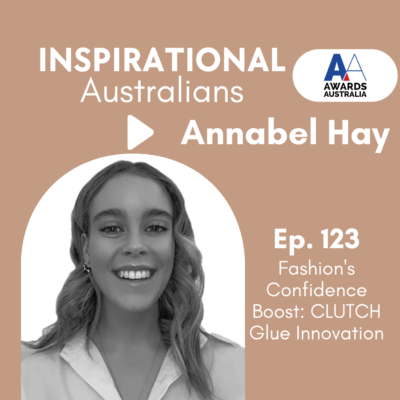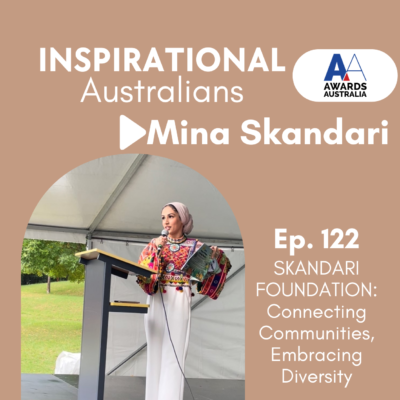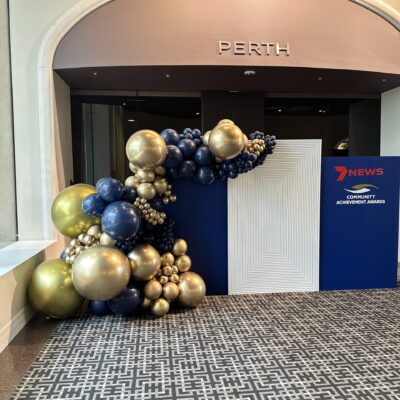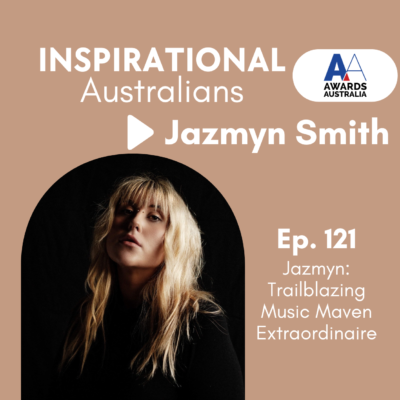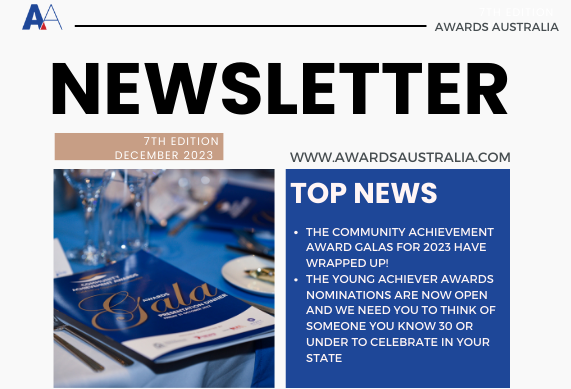In this week’s episode, Josh is talking to Aimen Jafri who was a Winner in the 2021 Tasmanian Community Achievement Awards:
Aimen Jafri is part of the Multicultural Council of Tasmania, Pakistani Cultural Society of Tasmania, and Shia Association of Ahl-e-Bayt Tasmania. In December 2020, she organised a Women’s Gala attended by women from all walks of life who showcased their businesses. Aimen has also organised International Women’s Day to bring together and help network women from migrant and culturally diverse and linguistically diverse backgrounds.
In this episode:
- We learnt about Multicultural Council of Tasmania, Pakistani Cultural Society of Tasmania and Shia Association of Ahl-e-Bayt Tasmania
- We also learnt about Migrant Settlement in Tasmania
Links
Connect with Aimen on LinkedIn
Want to chat or contact Aimen – she’s happy to chat and give advice.
Her email is: aimenjafri@hotmail.com and her mobile is: 0405 125 590
Want to know how to Rate and Review a podcast, see this article
Follow us on our Inspirational.Australians Instagram Page
Want to nominate someone? (It can take as little as 2 minutes to recognise someone making a difference)
Like some more information on Corporate Partnership?
Transcript
[00:00:04] Annette
Welcome to the inspirational Australians podcast, where we chat to people making a difference in their communities and in the lives of others. And here is your host for today, Josh, with an
[00:00:21] Josh
Thank you Annette. So straight to it this week for our dose of inspiration, I’m chatting with Aimen, who is joining us from tasi almonds are part of the multicultural Council of Tasmania, part of the Pakistani cultural Society of Tasmania and sheer Association of Albert Tasmania. And also secretary of the Clarence little athletics centre Aimen. Welcome to the podcast this morning. We’re actually in the afternoon, how are you going?
[00:00:48] Aimen
Hi, josh., thank you so much for having me on. I’m doing great. Thank you.
[00:00:52] Josh
That’s good. Thanks for the thumbs up there with my pronunciation of. I’m a bit Tasmania and you know, I do have a good friend who’s of Arabic descent, Egyptian. And unfortunately, his dad and sister only taught me words that are probably not very appropriate. For the inspiration Australians australia’s podcast. And so now I’m like, why don’t they teach me some good words in Arabic so I can actually use but thanks for joining us. Your bio is so interesting. I mean I do you want to read out questions about some of the things covered in your bio and about your award win. So you won the Heather and Christopher Chuong outstanding achievement award as part of the 2021 community awards. And this is part of what your award win was all about. You organised a women’s gala in the end of 2020, which was attended by women from all walks of life will showcase their businesses. And as well as that organised international women’s day events, bringing people together, helping network women from various migrant and culturally diverse backgrounds and linguistically diverse backgrounds. I know that beyond those events there was so much more that you’ve been doing in Tasmanian communities. So where should we start even
[00:02:00] Aimen
where you want to start from? But yeah, I came to tassie in 2018 and I am a professional myself. And when I started looking for work, I faced a lot of challenges not only from the tassie minority community, but from the market environment as well as from my own community because I am a Muslim migrant women who wear the hijab. So all these three boys that I said was my minus points, according to my own community, and being tasi being a very small market. It was hard for me, coming from outside to find a job. So I started volunteering and then I started looking for work and it took me one whole year to find a fixed term employment in organizing. Yeah. So you went through a lot of challenges because I did not have friends, your family, your just one family that I knew from back from the Middle East, from Iran migrated. So that lady was here. She was very, very helpful. Had me organized. But yeah, so when, when I started working, I realized that, you know, there are, there are a lot of migrant families who are coming to tasi. And if I can remember correctly, the net overseas migration is around. There are around like 65 per cent people arrive in Tasmania on temporary visas, and around thirty seven point one percent people come on prominent residency. So there are, there’s a lot of people coming in Jersey and everybody has the same story, especially the skilled migrants who are looking for work. So I thought that, you know, this is a good opportunity for me to advocate the challenges of the migrant community. And because I have already been through that process of building my network and establishing the trust that I needed to, if it was an easier path for me to help other migrants settle in. And I think with this intention, I started advocating the issues of the migrants and it actually helped me. I was able to Connect a load of migrants to a lot of organisations and I’m still evolving and Learning, helping other migrants doing that as well as our different departments. What are the issues highlighting? ? I recently had a session with a department of forestry who actually want migrants to work for them, but they were, they wanted to know why migrants are not coming towards the forestry department. So the, there was issues in discussions around that thing as well. Not.
[00:04:33] Josh
Yeah, there’s so many things to think about with that. So when, when you arrive in 2018, you talked about some of those points that were perceived as being negative about you did. Did you have people flat out telling you those things as well?
[00:04:47] Aimen
Yes they were, and actually I have, I’ve recently done a project with the equal opportunity Tasmania, where we were talking about what happens when people migrate. When people are migrating to any country, not even anywhere when they migrate, when they leave their home country, they move with a lot of burden. I always say that there, there is a social burden because you’re moving to a new place. There’s always fear of the unknown, the anxiety is that you move with financial burden and you’re coming with a psychological burden. And then when people do, you know, see stuff, do you like that or you will not get a job or there’s a lot of racism going on. There’s been, there is a lot of unconscious bias. It tends to break you, you feel so demotivated? Sometimes people there are no, we’re just going to go back on where we came and and things like that. So yes, people were telling you straight on my face, one of the guys that I met said all when you go for a job and you just take off your job and go because you’re getting a job will not get a job. No, I do not want to work for an employer who will not hire me just because I dress differently. My difference is my father. If I’m coming from outside, I’m bringing a lot of international experience with me, a lot of exposure, international exposure, and especially now when, as he is developing as a migrant community, things will change year. Yeah, it was, it was very demotivating.
[00:06:05] Josh
Yes. Some people said they just don’t think before they say things do they, that’s the horrible thing. So imagine somebody telling you to do that, and I’m glad that you persevered and pushed through those challenges because the work you’re doing now is very important to help other people feel ordered when they come, because you’re spot on when you come to somewhere new, you know, you don’t have that family support, you don’t have friends, the knowledge of what you’re doing in many place. So yeah, it would be really hard.
[00:06:34] Aimen
I’ll give you an example even for the language, even though I lived, I grew up learning English. English was my medium of Education and I came to tassie. In fact, when I came to Australia at the immigration counter, the officer asked me, so how you going? And I said, I’m going by car. I mean this so much difference, even at my world, there are a lot of things that I don’t understand and I just saw my first language. I cannot get there. I know
[00:07:01] Josh
that’s so true.
[00:07:02] Aimen
So we already work really, really hard, you know, just to fit in and do stuff like that. But it does get really hard at times because so many people discourage you and you know, you’re not good enough to be here.
[00:07:16] Josh
That’s not great. So can you tell me how many they did that give me the exact stats but migrants coming to Tasmania is that common? I’ve got two lots of the migrants because I’m not aware of that.
[00:07:29] Aimen
Oh, well, see the migrant community, because usually people come to Australia either on student visas or they come as skilled migrants. Obviously everybody wants to be part of the country. Australia is such a beautiful place. But Melbourne Sydney, the metropolitan cities are already saturated enough, accommodate people. So the states have opened to regional areas and they want people to be there. Obviously tassie is one of them is one of the most most beautiful things I’ve ever been in my life. So that’s why a couple of years study still new to migrants. So obviously the perception is still there. People are not sure that if somebody was coming in rather they, they would be able to fit in or not. So a lot, a lot of migrants are coming in, but he is not ready to host migrants right now because we do not have the right infrastructure. We do not have proper roads, medical facilities enough to accommodate so many people. So I think it’s just going to go away somewhere, so we need people to develop the state and again state to complete so many people at the same time. I mean, Right now tassie is the sixth. If I’m correct, sixth most populous state of Australia with Around five hundred and forty two thousand people, I think
[00:08:53] Josh
yeah, so what we’re hearing, it’s not easy for migrants to just come into Australia and you are talking about as he specifically and, and adjust to life. So I know that you’d help people, but how do you even come across the new migrants?
[00:09:08] Aimen
I had an opportunity to, or I think it was just a stroke of luck because my fate to be in this position. During my volunteering time, I was wondering with the migrant resource center, so I made a lot of connections there. I met a lot of new families there and obviously when families come then they just connected to one another in one way or the other. Then I got an opportunity to work with various clinics and every everything I was volunteering seven days a week, so everything was happening at the same time. And I was sort of where I would go to a volunteer work in the morning and I would go to my networking programs in the evening because Daisy being a Lego very well connected state. There are almost 97 percent of businesses in Tasmania. Are small businesses and estimated around thirty seven thousand one hundred small businesses. Thirty six thousand. So out of thirty seven thousand one hundred two hundred businesses registered in Tasmania. Thirty six thousand eight hundred are small businesses which employ around 100000 tasmanians. So everybody’s connected to everyone. So while volunteering at Platt ends while and getting a tree Association, one volunteering at sixty one, volunteering it, got everything just started to make sense. I was also before I so I got to my job at the Department of police, foreign and emergency services which actually came as a shock to a lot of people. Because again, Muslim migrant women wearing a hijab sitting in the police Department was something as a shock for a lot of my community members. So but prior to joining my work, I was also working for beacon foundation. So I was watching and getting there and then it just all made sense that you know, everything happens for a reason. Everything happens for a purpose. So if I’m working with the family and somebody else knows that Yes she is there, she has the resources, she has the medical so she can get us connected to people. People approach me me through me or through PTSD or any other organization. And, and luckily thank God that I’m able to help them it’s, it’s always very confronting for me that when somebody come up to me with help or any guidance, I always say, God, please help me to help them out. Because if somebody is coming to you for help, they’re very hopeful that Yes, you would be able to guide them through. And luckily, so far I’ve been able to do that. Angle fingers crossed for that.
[00:11:47] Josh
Was there a moment or someone in your first could be year or shorter when you arrived in tassie who you feel did that for you? It helped support you?
[00:11:59] Aimen
Yes. As I mentioned when I came to Tasmania, I had a colleague back in Qatar where I was living before. And she is she was pursuing her PhD from utah’s. And when I asked her, you know, I intend to stay here. She was very helpful. I had to go back to back my stuff and she did everything for me. She set up my house, she did everything like when I, when I landed in Tassie, I just went to her place, had dinner and just went straight to bed. So that was a bit of an easy, easy thing for me, but why I do that for other people is that everybody that I met professionally, they have been very, very helpful. When I went to migrant resource center, I made this wonderful lady their who actually guided me, its volunteering and I started volunteering and everybody, whoever they can, whatever they can do in their own personal capacity. They were doing that. So that’s why I got the motivation of helping other people this Well, and I learned how in from some other people I should do the same and get what would you what good you do come back to us.
[00:13:07] Josh
Yeah, Aimen, that’s so true. It’s such a great motto to live by what you know, what you do comes back to you and yeah, it’s fantastic to hear that there was people there supporting you as well. And even though they were your friends, it’s a great way to start off. I’d like to ask you about, you know, you’re very passionate for what I understand about empowering women. And so you tell us where that kind of started and how that passion came about for you. And
[00:13:33] Aimen
again, for me, for multicultural women and especially Muslim women, there is a, I know there is an image that they’re very oppressed. They are there, they cannot achieve anything or they’re always, you know, they have their head down. I heard this again that you know, how can you do so much? ? I can use, you know, how you’re able to do all these things. But I always say that Islam is one of those religions who talk about women empowerment, who talk about women with freedom of women who talk about women, right? But they’re just portrayed in such a negative way that people misunderstand that thing. So I always say that I am a perfect example of a Muslim woman. I’m independent, I’m confident I can see what I want to see and well-supported supported by my family sometimes But yeah, and then sometimes it’s very important to really like make women realize what they are capable of doing. We’re told most of the time that you know all, once you’re married or you have kids, you have family. That’s all you know. There are so many things that women can do at the same time. And we know this thing somewhere deep down inside is just that you need to refresh what you’re capable of doing. When I was organizing the women’s gala, I kept telling my working group that, you know, you have no idea what you’re capable of doing. Believe in yourself and just trust the process and start doing it and it was so good. The event was organized by homemakers who have no idea how to do event management. And that that event went out flawlessly. I was so happy and then they themselves realized that Yes, they can do, you know, if they want to do something, it just grew after that.
[00:15:22] Josh
So is that event going to continue?
[00:15:25] Aimen
Well we can, we have not just thought about it, but we started doing another program for the multicultural women networking session. So we did our first session in March 2021, just one because this is the third session we did on Friday and we’ve been very successful. And the idea of doing this multicultural migrant women networking session is that the women who are actually want to come back into the work area, especially in tassie. We want to give them job ready if they’re going through any issues we would like to help them. So what the format of the program is that we invite different organizations who would like to focus on cultural diversity and inclusion. And we invite speakers who have actually lived experiences of that program’s team. And we invite other though, do the event is open to everybody, not specifically targeted to multicultural women. Majority of it is, but it’s open to every women to come because I’m not like, there’s been a focus on my government. I empower everybody, everyone I’m feeling. So like, for example, our first session game was volunteering because volunteering is very much underestimated amongst the multicultural community. They do not understand how powerful media monitoring is, and especially in busy demographics, just as we are such that everybody knows everyone. So when you volunteer, you build your networks, you go meet people, you show who you are, you gain their trust and that actually escalates finding the right employment. So our first nations team was volunteering and then our second session thing that we did in September was getting job ready. So we invited organizations like this for success. We invited organizations like high collective and we invited organization for mass national day to apprenticeship and traineeship programs. So women who wanted to get them go for job interviews or wanted to have basis for job interviews. They could go to dress for success and get those things done. And our finest thing was about Mental illness. Mental health. What happened to Mental health of a woman when she’s migrating on a skilled migrant women who know whatever Mental health issues they might have. And a lot of women shared their experiences. What happened, why they came to Gaza and what happened during their process? ? The meltdowns, the depression, that anxiety expectations, disappointment were mean words that came out. They were expecting something else, something else happened. So we just like changed the track on that thing that we wanted to do, but it’s coming out really, really nice.
[00:18:23] Josh
And so you’re talking about I would love what you’re saying about the tracking back a little bit. The event that was run by homemakers and they’re learning all these different skills. Is that common to come across with the work you do when assisting migrants and migrant women? If there’s people with all different stages of their career, for example, someone who maybe hasn’t had a professional career than others who, who are skilled migrants, who still can’t get it work. Do yet say all those different types of people.
[00:18:52] Aimen
Yes, I do. I meet a lot of families were new. I’ve actually recently come across as a lady, she’s a doctor and she wants to go back into the field, but she doesn’t know how to do that because she has two small daughters and she does not know where to take it up from. She was like, Oh, should I stay here or should I go to the mainland? What should I do? So I had a discussion with her. We said, what are the possibilities of her working here? How we can manage her kids? ? What we can do. So it’s just really an issue of discussion that we are doing, but there are a lot of ladies who want to go back, but they don’t know how they do not have that access. Some, sometimes people are just sitting at home with no experience with no local experience. This is one thing that I came across a lot. You cannot work because you do not have a local experience and it actually became a vicious circle kind of the thing that, you know, I was not getting a job because I did not have no place feeds. And I can not get local excuse because there was no work. But this is where volunteering comes in. Even if, like I always tell the students that you know you win if you’re going. This is something I’m giving out, I shouldn’t, but I’ll tell you. I understand that, you know, even if you get a chance to volunteer for one hour, you should do that because it’ll start reflecting on your credentials to start reflecting on your resume and nobody’s going to ask you how many are you working your, your volunteering? It really shows you want to do if you want to pursue a proper career. And if you want to work somewhere, somebody in an organization at peace, you should start volunteering so that it reflects on your CV that Yes, this X, Y, Z is actually working in an organization and Learning skills there.
[00:20:27] Josh
That’s brilliant advice. And one thing that I’m really enjoying hearing from you is a lovely parallel between what you’re saying and the advice you’re giving. And the advice I’ve heard from someone at the exact opposite end of Australia, the very top up in Darwin. So we’ve interviewed Amy Hetherington on this podcast, and she touched on some of these things about settling into a new community. Yeah, it’s great to volunteer because you can become part of that community. And so you’re giving that same advice from a slightly different Angle. I just think it’s so clever, what you’re saying. That’s such a great starting point for a professional career to show that you care. To show that you’re a good person, you’re volunteering and as you said, you’re getting to know people in the community. So I think it’s great advice and it’s cool to say that it’s as applicable in tassie as it is up north in one.
[00:21:18] Aimen
Yeah, definitely. It’s very, it’s very important. I don’t know what Darwin having been there for tassie. It’s very important because again, it’s a very close knit community where feel and state people know each other. And obviously if I have a small business, I would like to hire somebody who my friend is recommending rather than somebody coming from outside the country.
[00:21:39] Josh
That’s a good point. So, you know, with all the community groups that you’re part of like the or abbreviations I kind of have to think in multicultural Council of Tasmania. That makes sense. But you know, there’s those cultural societies that you’re part of.
[00:21:54] Aimen
So that’s what I’ve learned as you just shorten everything.
[00:21:59] Josh
It’s a very easy thing. Well, I would just say more words if you can just shoot it down. Am in so involved with all these people. Then there’s Clarence little athletics center.
[00:22:11] Aimen
I got to go
[00:22:12] Josh
back. That’s brilliant. Yes. So what got you started there because that is a bit different than the other groups that you’ve got to
[00:22:18] Aimen
actually Clark was the first organization that I started volunteering, I play club volleyball for the women’s volleyball club, and I always, I was very, very passionate about sports since I was a kid, so when I came here and I went to volunteering in Tasmania, they showed me that there’s an opportunity of a secretary, a flag, and would I be interested in sending my resume out there and I did. And got called for an interview and I met the president of the center there because he is a really, really nice gentleman, though he was a bit shocked to see me for the first time because he wasn’t expecting me in this attire. But I hope he doesn’t hear this broadcast. Now I’m sure he, you know,
[00:23:03] Josh
, that’s one thing about I think moving forward as a Society and becoming more inclusive, more accepting is we have to acknowledge that sometimes we do have biases whether we are aware of them or not. And I think it’s better to grow and say, look, I did have the bias. I wasn’t ready for that, but I’ve now learnt
[00:23:23] Aimen
now he is such a nice guy. We’re really good friends. He has been, he has been my guide and my mentor. I think it is because of him that I am sitting here today because if he, I mean, I will do this to him. If it wasn’t for him, I would not have gotten a chance to volunteer to work anywhere else. So this I am indebted to him for the rest of my life,
[00:23:43] Josh
and I bet you would have won him over with your volleyball skills.
[00:23:48] Aimen
I’ve been with black for three years now and probably this will be my, this is my last season because I I have big projects coming up in this year and I will not be able to give time. And I’m really sad leaving that got really awesome, a bunch of people that you need to mourn for
[00:24:07] Josh
sure. Yes. So there you go, because I was wondering how did you get involved? ? So that all makes sense, and I love volleyball myself as well. So it’s a, it’s a good sport, I feel like volleyball has a really good community compared to some other sports. It’s very seems to be very tight knit
[00:24:21] Aimen
Mm-Hmm. Yes it is. It is.
[00:24:25] Josh
So I’m in kind of before we came live up to the podcast today, we were having a quick chat. And you mentioned one thing which I kind of wanted to dig into a little data about how at the awards night. And I mentioned at the top that you won the Heather, Christopher John outstanding achievement award. There was a few other finalists there. And I think maybe perhaps you were thinking that you might not be the winner. Would I be correct in saying that?
[00:24:50] Aimen
Definitely, I actually did not write any single thing and a Thank you note from my sponsors and anybody there because I was 100 percent. Sure. I’m not going to win because my, my most of my work is in advocacy is more. I do a lot of talking and talking and seeing the issues, so I cannot if you will ask me again, can you name 10 things that even do things that you do? I cannot show anything, do you? ? Because it’s not that I acting like it’s just in the head. So it was I was 100 percent. Sure. I’m not going to win. And then when Heather Chong said, a Majority is like, Oh Oh my God, I think I was very, very loudly. I said find out And then I got so nervous, I ran up to the stage and then I forgot that I had to say something to say thank you, but obviously because I knew had the chance from before. I say, I said thank you to her. I said thank you to the sponsor and everything it worked out. Yeah,
[00:25:51] Josh
that’s funny. Well, I’m glad that we got a chance now so you can say some things here on this podcast. So, you know, usually with a nomination in any awards, but in the community achievement what we try and have, you know, people involved in the process. Who was it that was kind of nominating you and then helping you through that process.
[00:26:13] Aimen
I actually got nominated from awards Australia. So there was nobody who nominated me. I got contacted from award Australia that I have been nominated. I did actually ask them how they got my contact. So before this award happened, I was nominated for ABC radio community sports award. And I was the finalist for that, so from there they got my credentials and everything. And when I got going I was very skeptical about, you know, participating in this or not that I don’t know. How will I don’t, I did not know who to ask for, but then I said, well, my giving it a try and whenever I get involved in anything, I just go inside the project and I want to start be part of every single thing that happened and I’m really, really grateful that these awards happened. It had been such a wonderful learning experience. I was part of this campaign from the beginning and I tried my best to participate in every single thing that was happening. Whether you know, it was getting sponsorship for that night or it was even buying a table. I made all my friends buy their tickets. So I thought they would have, I bought 30 tickets. Then I got my organization to do sponsorship. I did. I collected as many support letters as I can. I wrote as many answers to the questions as I can. And I totally enjoyed the process when the, the viewer’s choice or the public choice award was announced. I made a video and I asked everybody across the world to participate in that. I really want to know how many votes today got on my picture. But it was an amazing experience. And I was constantly taking, thanking them for you know, doing this and making me part of this is, I mean, winning or losing it’s part of it’s just part of the process. But what I’ve learned throughout was a great experience. And actually one of my community members is nominated for the young achievers awards happening in June. And I actually helped her guided her the way I did my nominations, and I did my support and everything. And I was helping her writer answers and subordinate issues like, I never knew this was the way to do it. And she said, do winners, do the winners actually work that hard? And I said, well, I don’t know about the others, but I did. And I did win.
[00:28:49] Josh
Yeah, that’s really cool to hear. And it sounds like you’re, you know, talking about, you made everyone buy the tickets, but they wouldn’t have done it if they weren’t happy to support you and you know, I think it’s just returning and again with the people’s choice award. It was just people returning the goodwill. You said it yourself, you put you do good in the world and people come back to you and I think this is a great example.
[00:29:11] Aimen
That’s right, I did not know that. So many people love me outside of you are inside now, I mean I get so much positive feedback about myself. It’s now become, it has actually become really more motivating for me. But I think after winning the awards, the expectations are a lot more than what was previously because not many people knew what I was doing. But now I think I’ve become more in a public domain. So yeah,
[00:29:41] Josh
, well you are someone in the community who was involved now you’re an award winning advocate. It has a bit of a different ring to it, doesn’t it?
[00:29:48] Aimen
Yeah. But it’s hard. It’s really hard. I had a bit of a meltdown off the back and I actually had a bit of a depressive phase because I did not know where to go. What was, what was after this? And I have never worked with the intention of getting recognized, or I had never worked with the intention of winning an award. So when this happened or when ABC happened, I was like, well, what I’m going to, what I’m going to do, what I’m going to say to everyone that what I do because my volunteer work has always been a very private affair between me and my God. Because I want, I want a word from him, I don’t want to reward here. Then when your word to acknowledge obviously, then you tell people what you were doing even last Friday night. Somebody would ask me, Oh so you do you want to tell us what you do? And then obviously because we were sitting one to one, I had to explain it to him. And then at the end of a three hour session, he was a card. Thank you for doing what you’re doing. It’s very helpful for us because there’s so many, there are so many small things. There are so many small issues that people go through and they have actually made that a normal if they have normalised problems for themselves, that they don’t know are much bigger than them. And if, if we as a community try to help them, they become relaxed and they, they’re very thankful that we actually did. Like on the 8th, we did a housing session. There are a lot of migrants who are moving into shared accommodations or who are just taking or taking leaves from private landlords. And they’re becoming victim of bullying from the landlord. And they do not know what their rights are. So we did a, an awareness session with the tenants union Tasmania, who came to Amcor, didn’t do information session telling people what the right side of the tenants when what, what are their boundaries where there are limits? Why? Because because again, the new arrivals coming in and with the housing crisis, there is there are a lot of issues, but people are scared to talk about it because they think they might lose their property or they did their landlord ask them to kick them out. But obviously they are protected under the tenancy act. So these are the issues that people are not aware of. And again, when I say that they’re coming with so many burdens, this is just one burden that we can help them take it all off. Mm-Hmm.
[00:32:20] Josh
That’s your rights issues that people aren’t aware of, they’re not. I’m not aware of these issues it’s, it’s very tricky. It sounds like it’s not an easy fix either.
[00:32:31] Aimen
There was a landlord who came into one of the houses and started taking pictures of the family members of the tenant. And she was so scared. She had a document, a document in her hand and he just graduated from. She just snatched it and it she got a really big bruise on her hand because of that. She was too scared to go to the police because she, she had three kids and she did not know that she might get kicked out. And she was really, she was really, really upset because of what had happened. Yeah.
[00:33:02] Josh
That said, absolutely. Yes, it’s horrible, isn’t it? One thing I know, I don’t like it when people hear these stories and then they they write it off or they try and brush over it. You know what I mean? ? So forgive me for not moving on. I just sometimes have to let it soak in and
[00:33:22] Aimen
it’s hard because see I am not in a political place. I am not in any sort of different place. I am a community volunteer. And if you can get this, if you will, and I’m just telling you something or one on one basis since they’re already talking about it. So it actually takes a toll on my Mental health as well. Because if somebody is calling me at 11:00 at night and crying on this issue, saying that Ayman, I’m scared living in my own house because my landlord is harassing me. It actually upsets me because I cannot do anything in my position in my capacity. And they’re calling me with the hope that you know, I might be able to have them out, but obviously it takes, I mean, it takes some time to do that. And it, it’s become really, really venerable at times. And sometimes I forget that, you know, I have to observe and not absorb these kind of problems, but I do end up absorbing it and then it takes a toll on my Mental health I. I feel really depressed. I sometimes sit in the corner and cry that you know, why am I not able to help people who are asking me to help them?
[00:34:34] Josh
And now it makes sense why I think I can get some understanding on why you may have felt. You know, you said you had some depression and feeling the pressure of winning an award like that when you won because that is a lot of pressure on you. And I think sometimes people, perhaps, yeah, they gloss over that, that the people who are, you know, giving up so much time and effort. It takes a toll on them as well as you’ve said. So I’m glad that you shed them. And maybe people can buy you a massage, just something relaxing. Need to take some time, you
[00:35:10] Aimen
know, you know, what’s really therapeutic for me when somebody comes up to me and say, you know what you did, has made a lot of difference in our lives. That is a, that, that’s my, that gives me the kick that I need to go through that day and to go through that phase. And I’m glad that that happens. People do come back with very good feedback.
[00:35:30] Josh
Yeah, that is rewarding. Definitely. So I mean, you know, I just, I’m struggling to understand what a day in your life looks like, because there’s just so much that we’ve talked about so many varied things. I don’t, I don’t know if that’s too much of a boring question to ask, but I am interested to hear what is it a day a typical day in your life look like?
[00:35:50] Aimen
Well, I have two kids, 12 and 13, and one goes to high School and goes to primary school and my husband, he works for a consulting company. So we had a family of four normal work like go to work, come back school life, food families now, but I try to divide my my phone started ringing five or five in the evening before their committee wants to know. What if, if there’s something that I can help them read or whatever, I try to organize myself as much as I can, because there’s a lot on my plate. I have to give time to my family. I have to look after myself as well. I realize that I cannot be in all the places at all, all the time. That’s why I, I work on empowering women and especially Muslim women because I want more and more to come in front and address the issues. And that’s why whenever I get an opportunity to bring somebody in, I do that. I do a lot of collaborative work wherever. But I think the Connect because again, I have that network of people around me wherever I think it’s appropriate to bring people together. I do that, but that takes off my responsibility. Somebody gave me a really good suggestion, Ayman delegate and celebrate. So I’m practicing that
[00:37:11] Josh
good advice.
[00:37:13] Aimen
I make my, my friends, my team members do a lot of work. Then I do kind of macro management. And then I love playing volleyball to my mind is after my volleyball as was for my athletics. That’s going to end soon. Yeah. Try to attend as many events that I can I, I try to work on my personal development. So I have my books, audiobooks, and books on my side, wherever. Whenever I get a chance to read or study, I do that I’m, I’m very lucky. I got a chance to do a very prestigious Australian Institute of directors program. So that’s coming up. I’m really excited for personal development training for that reason. So yeah, that’s just try to bring four hours is not enough, but I try to maintain that work life balance.
[00:38:02] Josh
I hear that that sounds like just so much on your plate, so many great things, but still with many things I can imagine there’s times when your kids are going like mom, we just want you to take us to the movies or something.
[00:38:14] Aimen
Yeah. It has actually started happening more frequently now because they’re, they’re going up and they need more time. So what I try to do is wherever I can take them with me, I do that that they know that the kind of work that I’m doing and that they’re also interested in, there’s international women’s day coming event coming up on Saturdays. I’m taking my daughter with me and she’s looking forward to it as well because I think now I’ve been, I’ve been volunteering in tassie for 40 years and for almost six years in total. So my kids are used to it now they’re like, Oh, I’m gonna do anything about my mom or she’s just like,
[00:38:51] Josh
I guess I would say an inspirational case. It’s an amazing example to set for your kids. That’s really cool. I remember going to the awards nights that my dad put on when I was a kid and not really understanding what it was all about. And then years later comes full circle when I started to work in this company in Australia, to see full circle with those memories and understanding the importance. And that’s no, I dare say that your kids will have that moment at some point down the track with they. They realize the importance of everything you’ve done that you’ve shown them and it will make a profound impact in their life.
[00:39:30] Aimen
I always, I’ve always believed in one thing that you know, God has sent you on the world to do in the words right to do different things, not just one thing. And you should always try to make best use of your self serving his people. And obviously then when you do what good comes back to you, I have there have been cases there have been times when I had been in such a difficult situation, which is just humanly possible to solve. And my issues have been like this. And I was saying, God, what just happened. So when people pray for you, their prayers work and you get out of very difficult situations in a very easy way.
[00:40:14] Josh
So it sounds like you must draw a lot of strength from your religion as well.
[00:40:17] Aimen
I’m a very spiritual person, I draw a lot of strength from energy, from positive people around me. And yes, obviously, Islam being a religion of Human nature, there are a lot of learnings it gives a lot of knowledge. If you want to pursue that line, motivated religious person, and they don’t get deceived.
[00:40:42] Josh
I mean, it’s been such a pleasure chatting with you. If people would like to learn more about some of the work you do your advocacy or any of that. Where would you suggest they they go to kind of follow along and see more.
[00:40:56] Aimen
So I have my LinkedIn profile, ninety nine point nine percent work that I do or that I will get is up on LinkedIn. And then I sometimes upload that on my Facebook and my Instagram as well, so that, that went public as well. I. I had to actually step out of my comfort zone. And when I tell people I’m an Android person, nobody believes me. I’m actually ready. I am an Android and it’s very hard to meet your dog. It’s very difficult for me to interact with people, but then again there is no growth in comfort. You have to come out of the comfort zone if you want to grow. And I like developing other people and I like to learn. So everything is there, on socials, but mostly on LinkedIn because I won the organizations or the professionals, or other authorities who are in the state to see that Yes. These are the issues are the ones that we are highlighting, and it would be great that they should be addressed if you want my audience to stay in taiji because this is again, one of the biggest challenge that Tasmania is facing right now. That Although the migrants are coming to Tasmania, but the state is unable to retain them, could be because of housing could be because employment would be because of lacking basic necessities like place of worship or like for example, Tasmania doesn’t have a Muslim graveyard. I’ve been Muslim, dies in tassie, either they have to be repatriated to their own country or they don’t know. Good.
[00:42:34] Josh
So yes, it’s just that people would not know that for me. So I guess, you know, you’ve touched on one really great example of what I’m about to ask you, but if there was something you could tell people like me when I say like me, I mean, you know, Aussies who just perhaps aren’t as aware of what life is like for a newly arrived migrant or something that we can, we can do or we should be aware of just to kind of, you know, to be more welcoming to make life a bit easier.
[00:42:59] Aimen
See. So the most important thing is that you should not be judgmental because the person who is coming to your country is carrying a lot of burden with himself or with herself. And if you’re judging them for whatever reason, could be very detrimental for them. Then give, give them time to adjust, be a bit patient with them, be it or more, be more compassionate with them. Because we all, we are all humans. We all share the same life, the same spirit, the same soul. So we are all part of the same life and having patience showing compassion towards the other person, I think they will just open up to you. I am actually working on a campaign right now, and that campaign will be called open your homes. Open your heart show the truth teller of A-Z. What we are planning is that the new arrivals coming in tassie, we will be requesting the Tasmanian community whoever wants to open their homes to the new arrivals. They are more than welcome to do that. It’s just in a very, very planning, initial planning phases. And I think this will again give an opportunity to our local Tasmanian community to come closer to the migrants, whether they are on humanitarian visas or their skilled migrants. And obviously when once you get to know different communities, I think it’s easier to understand and accept them to your
[00:44:26] Josh
degree. I agree with that. That’s one of my big philosophies in life is that if you don’t have a diverse group of people around you, if you don’t try and talk to diverse people that are different to you, then you’ll be very close minded. And so I just think I couldn’t agree with more, that’s just of paramount importance to talk with people from different backgrounds, whether that’s race, religion, sexual identity, whatever it is, you just become so much more aware. And as you said, we share the same lot with all humans and I think that with beautiful words that you had just before
[00:45:00] Aimen
and media portrays so much negativity about different people, different cultural people, again, gender identity and stuff. You should not believe that just give other person a chance to sit close to you and open up their heart to you and you will see that, you know, regardless of the color or the culture or the religion, we have same challenges. We have same issues. And we can all help each other grow.
[00:45:27] Josh
My last question for you today is, you know, before I get to the question just to say that you’ve been fantastic to chat with, I’ve really enjoyed it and very fitting guest for the inspirational Australians podcast. So the last question is, what is it that inspires you amid
[00:45:45] Aimen
people their heart, their stories? That’s my motivation.
[00:45:51] Josh
Simple yet very powerful.
[00:45:54] Aimen
That the see when I’m talking to you, I’m getting a lot, I’m absorbing a lot of your positive energy. And then there’s a lot to learn from you. It’s not just, I’m telling what I do, but I’m also learning A lot of things from you, and we’re here on this planet to learn. And everybody has a story, Although we live in one world. But when you talk to different people, you learn so many things from them, and there’s so much strength every person is getting in themselves. So yeah, that, that motivates you to do so many things.
[00:46:26] Josh
But I think it’s a nice message as well when you’re talking to someone to think about what you could be learning from them.
[00:46:32] Aimen
That’s very true,
[00:46:33] Josh
Aimen, Thank you so much. Been a pleasure chatting with you. Really, really honored to spend time with you.
[00:46:39] Aimen
Thank you so much for having me, Josh, and I look forward to talking to you more. Definitely.
[00:46:45] Josh
I hope you enjoyed that interview. If you liked it or any of our other episodes, it would be great if you can write and review the inspirational Australians podcast. It really helps us out if someone you know, needs a little dose of inspiration. Why not let them know about this podcast? And if you haven’t already, make sure you’ve subscribed, so that you won’t miss an episode. Join us each week as we talk with ordinary Australians, achieving extraordinary things. You can always head to our website at awards, Australia dot com slash podcast for more information and details on each guest. Now before we go, I’d like to thank Annette our producer. Here’s a fun fact. Annette is my mum and our other host, Jeff is my dad. This podcast is brought to you by awards, Australia, a family owned business that proudly uncovers the stories of people who make a difference for others. We can only do this with the support of our corporate and not for profit partners as they make our awards programs possible. So do you know someone making a difference? If you’d like to recommend someone to be a guest on the podcast, get in touch through our Instagram page, inspirational Australians, or maybe your business might like to sponsor the podcast or get involved with the awards. We run hitto website awards, Australia dot com for more details until next week. Stay safe and remember together we make a difference. Thanks for joining us
[00:48:12] Aimen
today on inspirational Australians podcast. We hope you enjoyed listening
[00:48:17] Josh
and have
[00:48:17] Aimen
been inspired by ordinary Australians achieving extraordinary things. So it’s goodbye for another week. Remember together we make a difference.


